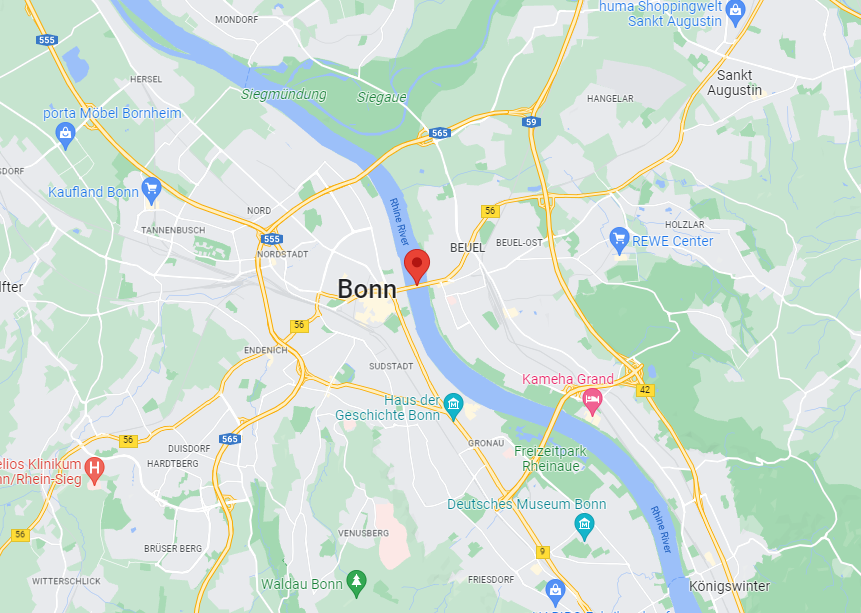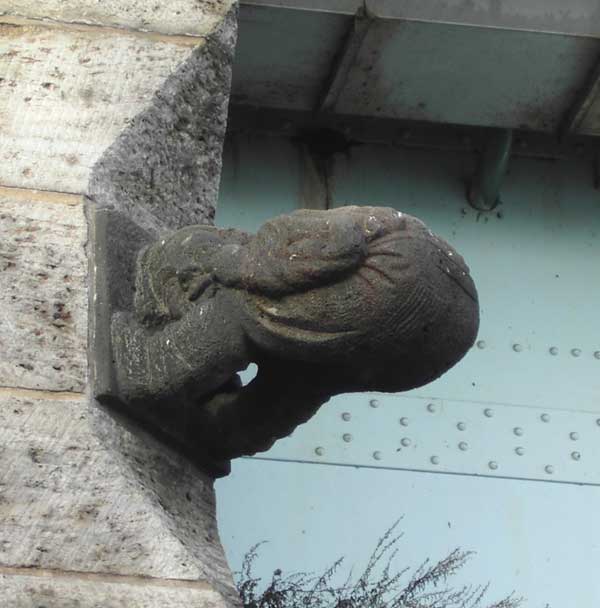The Moon Over the Rhine

Pictured above is a map of Bonn, a city in Germany that served as West Germany’s capital until the German reunification of 1990. The Rhine splits the city almost down the middle, with the main district of Bonn in the west and the district of Beuel to the east. Today, that distinction isn’t all that important; while Beuel was its own city until it was incorporated into Bonn in 1969, it’s now clearly part of the larger entity (as shown by its sparse Wikipedia entry). If you want to travel between the two sides, it’s not a problem — there are three bridges crossing the Rhine, including the Kennedybrücke — the “Kennedy Bridge” — that allow for easy access to either part of Bonn.
But over a century ago, that wasn’t quite the case. When the precursor bridge to the Kennedy Bridge was built, Bonn and Beuel were separate cities and friendly rivals. Connecting the two sides made a lot of sense — the ferries that serviced the Rhine’s shores couldn’t handle the foot or carriage traffic — but also brought two groups of people closer together than they probably wanted to be.
Which is probably how this happened.

Yes, that’s a statue of a man sticking his butt out across the river.
The original bridge opened in 1898 with a lot of fanfare; as one travel blogger explains, “although rain was bucketing down, a great number of people paid their toll to walk across the bridge.” And when the bridge was unveiled, so were the previously-hidden ornamental designs dotting its facade. One of them was the one seen above (well, the one above is a re-creation of it, but close enough). Situated on the Bonn side of the Kennedy Bridge, it told the people of Beuel what the people of Bonn think of them.
The Beuel faithful, though, took the joke in stride — and made some money off of it, too. The original bridge had a toll on either side; when you entered the transverse, you had to pay, but there was no fee to exit. The fame of the statue made it a sight to see for locals in the area, and — by design — the people on the Beuel side were able to see it without entering onto the bridge. But for the Bonnians (I can’t find what a person from Bonn is called, so I’m going with “Bonnian”), seeing the “Brückenmännchen” — the “bridge man” — meant going onto the bridge. The joke at the expense of the Beuelians (I made that one up, too) became a tax on the Bonnians.
Over time, the people of Beuel became to cherish the sculpture originally made at their expense. As Mental Floss notes, “it became a beloved icon in Beuel, appearing on postcards and banknotes.” And when the original bridge was destroyed during World War II, Beuel’s citizens weren’t willing to let the Brückenmännchen disappear with it; one of its people went into the Rhine to recover it, successfully. The original Brückenmännchen was reattached to the replacement bridge after its opening in 1949.
Unfortunately for those who value mooning prank sculptures, in 1960, some vandals got the last laugh; destroying the Brückenmännchen. Locals raised funds to re-create the statue (using elements from the original that could be found) and in 1963, the bridge man came back. After a short stint in a museum, he and his recreated backside are back on the bridge for all to see.
Bonus fact: After World War II, Germany was divided into East and West Germany. East Germany claimed Berlin, the combined nation’s former capital, as its own; West Germany, therefore, needed to designate one of its cities as its capital. The obvious option was Frankfurt, the largest city in West Germany at the time, with roughly 4x the population of Bonn. So why did Bonn win out? The provisional government at time wanted to leave the door open to reunification. As the New York Times reported, “compared to the alternative choice, the commercial and banking center of Frankfurt, sleepy Bonn was considered less likely to pose any claim to being more than a way station.” Basically, they (correctly) postulated that if the countries recombined, some people would likely object if Frankfurt was downgraded from capital to non-capital city, but no one would care if Bonn was.
From the Archives: Mayor, Mock Us: A politician mooned a student body. It didn’t cost him his political career; it enhanced it.
